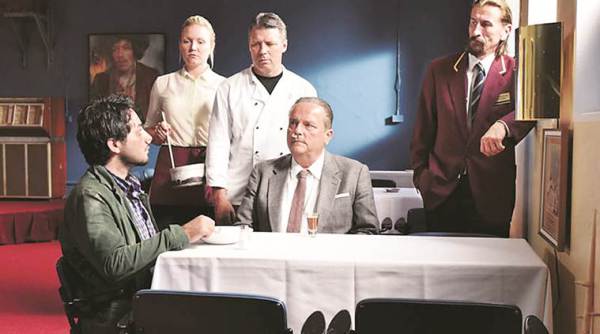In selected cinemas nationwide now.
Finnish filmmaker Aki Kaurismäki has carved out an extremely singular, idiosyncratic niche for himself over thirty years. He depicts an almost otherworldly, out-of-time Helsinki of endless cigarettes smoked in seedy bars, to a soundtrack of jangly fifties rock performed live by weathered, charismatic old men. A world of hope and kindness muted by a morose and mannered deadpan presentation. It could seem parochial, even determinedly insular, but recently he’s allowed the outside world to infiltrate.
His previous film Le Havre dealt with an elderly man sheltering a young African migrant. In The Other Side of Hope, Khaled (Sherwan Haji) a Syrian asylum seeker meets a former travelling shirt salesman Wikström (Sakari Kuosmanen), now trying his hand at running a soulless dive bar. It’s humanist message could feel forced, but this is a film that bears its weighty themes lightly. This is achieved through mirroring the experience of its two main characters. Their paths don’t cross until relatively late in the play, but both are simply depicted as outsiders and lost souls. Kaurismäki also deftly juggles his kindling-dry approach to comedy without ever undermining the trials endured by Khaled. He doesn’t flinch from depicting Kafka-esque bureaucracy or the bubbling piranha threat of racist violence.
It is true that The Other Side of Hope will be a very acquired taste. Like fellow Scandinavian Roy Andersson, Kaurismäki has a very particular and precise way of telling his stories that is as likely to alienate as engage. Although clearly a comedy, it doesn’t go for huge gales of laughter. Wry smiles and throaty chuckles are more the order of the day. It’s humour as minimalism; meeting absurdity with a straight face. If you haven’t enjoyed any of his previous films, this is unlikely to elicit a Theresa May-style u-turn.
What is undeniable is that he has a knack for casting actors with the most extraordinary faces. These are souls who look so burdened by the world, they can express it without the merest facial tic. Perhaps Emir Kusturica is the only other current filmmaker so captivated by the expressiveness of the human face, although he exhibits a Fellini-like carnival joy in the grotesque. Kaurismäki favours the lugubrious, the slightly lumpen, the doleful. It is from this unlikely seam that he mines his humour.
If you can attune yourself to this bizarre and anachronistic, yet warm-hearted and charming view of the world then these characters will welcome you with a grudging nod and a slug of vodka. This is like real life encroaching on a hermetically sealed community and finding it curiously seductive in a jaundiced way. Certainly, Khaled fits right in. Chalk one up for integration.
